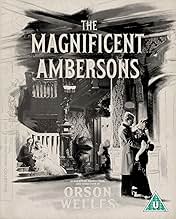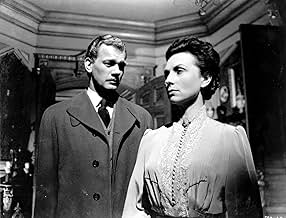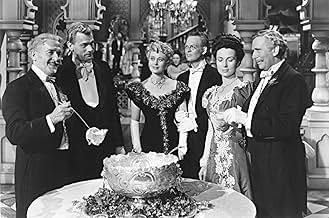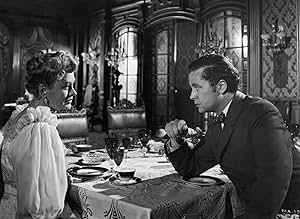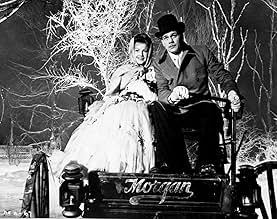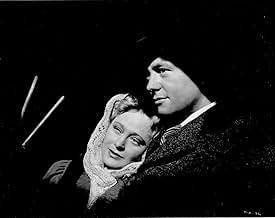AVALIAÇÃO DA IMDb
7,6/10
28 mil
SUA AVALIAÇÃO
O jovem herdeiro da decadente fortuna de Amberson fica entre sua mãe viúva e o homem que ela sempre amou.O jovem herdeiro da decadente fortuna de Amberson fica entre sua mãe viúva e o homem que ela sempre amou.O jovem herdeiro da decadente fortuna de Amberson fica entre sua mãe viúva e o homem que ela sempre amou.
- Direção
- Roteiristas
- Artistas
- Indicado a 4 Oscars
- 8 vitórias e 4 indicações no total
Orson Welles
- Narrator
- (narração)
Edwin August
- Citizen
- (não creditado)
Georgia Backus
- Matron
- (não creditado)
Harry A. Bailey
- Citizen
- (não creditado)
Olive Ball
- Mary - Maid
- (não creditado)
Jack Baxley
- Reverend Smith
- (não creditado)
William Blees
- Young Man at Accident
- (não creditado)
Lyle Clement
- Citizen
- (não creditado)
Bobby Cooper
- George Minafer as a Boy
- (não creditado)
Don Dillaway
- Wilbur Minafer
- (não creditado)
Avaliações em destaque
In this part of his career, Welles was interested in a few things. Thankfully we don't need the completed project to at least see what they were. And the understanding of them is probably more important than experiencing a coherent survey, as this was.
He's interested in surrounding a narrative, in giving it to us from all sides. He does this in narrative styles. In "Kane" he had narrators inside and outside the story, newsreels, newspapers, mysterious unfoldings, anticipated long events, and anticipated short ones.
He does it in the eye as well, having the camera surround and probe. And he plays these two off of each other, creating one sort of rhythm in the eye, another in the shifts of narrative, yet more in the physical movements on screen and finally in the emotional tides. Each of these is innovative, but together they become metacharacters in a sort of cinematic jazz. Oddly, the metaphor doesn't include the score itself for Welles, the one thing that has become a common skill today.
Now if we had the whole project, we'd get all the variations and pace in his jazz composition. As it is now, all we get are phrases, some broken a bit.
Just settle on one that you suppose hasn't been tampered with, say the sleigh/car encounter in the snow and revel in that for a few viewings, one after the other. It is absolutely amazing what interplay these elements have. And in this case we really do have some music: the players singing.
I suggest you play it again and again until you get it. Believe me, it will change your life when you can see this mind dance.
I would rather have the pieces because they have such a perfect logic and dance, you can imagine the rest. It baffles me that some people think Welles just innovated in camera angles and lighting. No, he created a whole higher level of drama.
Van Gogh painted a starry sky. It is, in effect two paintings in one. We have the beauty of the sky. And we have the beauty of the dabs and strokes of paint on the canvas, a sort of metapainting. The two dance around each other in a way that is magical. Welles did the same here and in "Kane." Afterward, he busted other walls.
Oh, and within the story, he uses automobiles as a metaphor to muse on the effect of this new metadrama compared to his home in the simpler theater. He wonders if we will be better off once what he does catches on.
Ted's Evaluation -- 3 of 3: Worth watching.
He's interested in surrounding a narrative, in giving it to us from all sides. He does this in narrative styles. In "Kane" he had narrators inside and outside the story, newsreels, newspapers, mysterious unfoldings, anticipated long events, and anticipated short ones.
He does it in the eye as well, having the camera surround and probe. And he plays these two off of each other, creating one sort of rhythm in the eye, another in the shifts of narrative, yet more in the physical movements on screen and finally in the emotional tides. Each of these is innovative, but together they become metacharacters in a sort of cinematic jazz. Oddly, the metaphor doesn't include the score itself for Welles, the one thing that has become a common skill today.
Now if we had the whole project, we'd get all the variations and pace in his jazz composition. As it is now, all we get are phrases, some broken a bit.
Just settle on one that you suppose hasn't been tampered with, say the sleigh/car encounter in the snow and revel in that for a few viewings, one after the other. It is absolutely amazing what interplay these elements have. And in this case we really do have some music: the players singing.
I suggest you play it again and again until you get it. Believe me, it will change your life when you can see this mind dance.
I would rather have the pieces because they have such a perfect logic and dance, you can imagine the rest. It baffles me that some people think Welles just innovated in camera angles and lighting. No, he created a whole higher level of drama.
Van Gogh painted a starry sky. It is, in effect two paintings in one. We have the beauty of the sky. And we have the beauty of the dabs and strokes of paint on the canvas, a sort of metapainting. The two dance around each other in a way that is magical. Welles did the same here and in "Kane." Afterward, he busted other walls.
Oh, and within the story, he uses automobiles as a metaphor to muse on the effect of this new metadrama compared to his home in the simpler theater. He wonders if we will be better off once what he does catches on.
Ted's Evaluation -- 3 of 3: Worth watching.
This is a very good film, but certainly NOT as great as some of the hype would indicate. One IMDb reviewer went so far as to say it was "better than Kane (CITIZEN KANE)"! In fact, over the years a sort of "mystical" adoration of this film has arisen that is completely ridiculous and way out of proportion. In fact, Orson Welles HIMSELF said that the film we all know as THE MAGNIFICENT AMBERSONS was terribly edited and he disowned his film--so WHY all the hype?! Let's first review the history of the film. The ORIGINAL Orson Welles version of the film no longer exists--or at least no one has found it. When the original and significantly longer version of the film was previewed, the audiences found it depressing and too long--and possibly this was due to WWII just starting and people wanted a happy an uplifting film. So, when Welles wasn't looking, RKO reedited the film severely and gave it an upbeat ending!! So, if the film is only a bastardized version of the original, it just doesn't make sense to declare it a masterpiece as so many have done. In fact, when I watched it for the third time, I noticed many places where the film seemed to skip about and MANY times there was narration instead of action--as if they'd delete major scenes and then just describe what you missed in a few sentences! This is NOT great film making! So what do we have left? Well, the acting is exceptional throughout and there is often the trademark excellent Orson Welles black and white shadowy cinematography. The total package is pleasant enough, but way too sketchy and disjoint. Good, but certainly NOT great. If only someone would find the original film hiding somewhere in a vault!
With an excellent cast, interesting characters and setting, and a thought-provoking story, dramatic cinema does not get much better than "The Magnificent Ambersons". No one will ever know what it would have been like if Orson Welles' original version had been allowed to stand as it was, but what is left is still extremely good despite the missing portions.
The story of the leading residents in a turn-of-the-century town combines some interesting themes. The snobbishness of the Ambersons, and its effects on their lives and others' lives, is illustrated alongside the ways that increasing industrialization is changing everyone's lives. The period setting is also quite interesting in its own right, and very nicely done. The characters are all convincing and well-defined, and are matched nicely with fine performers who bring them to life convincingly. Welles regulars Joseph Cotten and Agnes Moorehead are especially good.
The only real disappointment in the movie is that, due to all the cuts made against Welles' wishes, there are times when it is obvious that a scene or information is missing, since characters at times refer to events that are not quite familiar to the audience. It is fortunate that the acting and writing are good enough to help us fill in the blanks to some degree, but it is really too bad that we can never see the whole picture.
As it stands, this is a fine film filled with good scenes and memorable characters, and a movie that will be much appreciated by fans of classic cinema.
The story of the leading residents in a turn-of-the-century town combines some interesting themes. The snobbishness of the Ambersons, and its effects on their lives and others' lives, is illustrated alongside the ways that increasing industrialization is changing everyone's lives. The period setting is also quite interesting in its own right, and very nicely done. The characters are all convincing and well-defined, and are matched nicely with fine performers who bring them to life convincingly. Welles regulars Joseph Cotten and Agnes Moorehead are especially good.
The only real disappointment in the movie is that, due to all the cuts made against Welles' wishes, there are times when it is obvious that a scene or information is missing, since characters at times refer to events that are not quite familiar to the audience. It is fortunate that the acting and writing are good enough to help us fill in the blanks to some degree, but it is really too bad that we can never see the whole picture.
As it stands, this is a fine film filled with good scenes and memorable characters, and a movie that will be much appreciated by fans of classic cinema.
This is a wonderful film, one of great pathos and sensitivity. Orson Welles was drawn to Tarkington's novel because Tarkington had been a friend of Welles' father and Welles identified strongly with the story, seeing something of his own family's history there.
Whether it is better than Kane is a fun question for film clubs to debate (I did once but I don't now), but it is interesting to note that while Orson Welles was particularly bitter that RKO re-shot his ending to make it more appealing to audiences, if you read the novel you will see that it is the novel's ending that RKO tacked on. Welles' ending was of his own invention and would have given the film a completely different tone.
So it is ironic that Welles always seemed to claim that RKO had destroyed the integrity of the novel's story when they only preserved it, if rather poorly in execution.
Whether it is better than Kane is a fun question for film clubs to debate (I did once but I don't now), but it is interesting to note that while Orson Welles was particularly bitter that RKO re-shot his ending to make it more appealing to audiences, if you read the novel you will see that it is the novel's ending that RKO tacked on. Welles' ending was of his own invention and would have given the film a completely different tone.
So it is ironic that Welles always seemed to claim that RKO had destroyed the integrity of the novel's story when they only preserved it, if rather poorly in execution.
10Don-102
People may initially be thrown by the title MAGNIFICENT AMBERSONS. Some may consider it a stuffy period piece before seeing it if they know only of the novel. Don't make this mistake if you have not witnessed this cinematic milestone. The title, of course, is caustic and refers to the 19th century family sarcastically. Who else but the great Orson Welles could follow up a masterwork like CITIZEN KANE with such a cynical and important drama. The "magnificence of the Ambersons" is neither grand, nor respectable. It is tragic and doomed, epitomized by young "Georgie" (played by Tim Holt), whose main ambition in life is to be a yachtsmen. He is buried under the lore of his family name and he is headed towards his well-deserved "comeuppance".
The film itself, like many of Welles' great pictures, was absolutely butchered by the studio (RKO Pictures) and destroyed the credibility of the young auteur. In many ways, the mess surrounding the film's release, the tragedy and loss of the Ambersons, and the theme of modern technology "taking over" all come together to leave all parties disappointed. Disapproving moviegoers miscalculated the message, led the studio to make the cuts behind Welles' back, and placed a lot of artists in some bad situations. (For an excellent account of this truly remarkable story behind the film, read Joseph McBride's bio "Orson Welles") 50 minutes of film were burned, however, the 88 minutes left for us to see contain some incredible, even revolutionary moments.
Joseph Cotten plays his consummate "2nd place" character, a man unable to have his real true love. (See THE THIRD MAN, NIAGARA) He is in love with an "Amberson" (probably the only righteous family member played by Dolores Costello) but loses out to a more "respectable" man. The essential themes of industrialism and change that will ruin the Amberson family stem from Cotten's position as an inventor. He has created the horseless carriage, or automobile, however primitive, which is continuously trashed by the hateful "Georgie". Cotten's invention is part of the growth and change that many families of the late 19th century may have ignored, only to have their lives passed over and fortunes lost. Plot elements aside, this central theme is the powerful backbone that leads to the inevitable destruction of the narrow-minded Tim Holt.
The latter aspects come across on screen so memorably because of Orson Welles' continued experimentation with film. Incredible b & w photography, at first a hazy glow depicting the early prime years of the Ambersons, then a stark, dark force portraying shame and sadness, is amazing to see. Overlapping dialogue is used even better here than in KANE and Welles' narration is so omniscient and on the mark, relaying the town's thoughts on this once grand family. Long tracking shots throughout the constantly changing town go unnoticed unless seen a couple of times. When you realize the passage of time through these devices, you will be in awe.
Again, there is tragedy in both the film itself and its shoddy release and treatment in 1942. If only Welles stayed in America at the time and protected THE MAGNIFICENT AMBERSONS from the long arm of the near-sighted studio system, he may have had #'s 1 and 2 on the AFI's list of 100 Greatest American films.
The film itself, like many of Welles' great pictures, was absolutely butchered by the studio (RKO Pictures) and destroyed the credibility of the young auteur. In many ways, the mess surrounding the film's release, the tragedy and loss of the Ambersons, and the theme of modern technology "taking over" all come together to leave all parties disappointed. Disapproving moviegoers miscalculated the message, led the studio to make the cuts behind Welles' back, and placed a lot of artists in some bad situations. (For an excellent account of this truly remarkable story behind the film, read Joseph McBride's bio "Orson Welles") 50 minutes of film were burned, however, the 88 minutes left for us to see contain some incredible, even revolutionary moments.
Joseph Cotten plays his consummate "2nd place" character, a man unable to have his real true love. (See THE THIRD MAN, NIAGARA) He is in love with an "Amberson" (probably the only righteous family member played by Dolores Costello) but loses out to a more "respectable" man. The essential themes of industrialism and change that will ruin the Amberson family stem from Cotten's position as an inventor. He has created the horseless carriage, or automobile, however primitive, which is continuously trashed by the hateful "Georgie". Cotten's invention is part of the growth and change that many families of the late 19th century may have ignored, only to have their lives passed over and fortunes lost. Plot elements aside, this central theme is the powerful backbone that leads to the inevitable destruction of the narrow-minded Tim Holt.
The latter aspects come across on screen so memorably because of Orson Welles' continued experimentation with film. Incredible b & w photography, at first a hazy glow depicting the early prime years of the Ambersons, then a stark, dark force portraying shame and sadness, is amazing to see. Overlapping dialogue is used even better here than in KANE and Welles' narration is so omniscient and on the mark, relaying the town's thoughts on this once grand family. Long tracking shots throughout the constantly changing town go unnoticed unless seen a couple of times. When you realize the passage of time through these devices, you will be in awe.
Again, there is tragedy in both the film itself and its shoddy release and treatment in 1942. If only Welles stayed in America at the time and protected THE MAGNIFICENT AMBERSONS from the long arm of the near-sighted studio system, he may have had #'s 1 and 2 on the AFI's list of 100 Greatest American films.
Você sabia?
- CuriosidadesOne of former silent star Dolores Costello's last roles. She was forced to retire from the film business as her face had become badly scarred by early film makeup, which was highly caustic.
- Erros de gravaçãoTowards the end of a long tracking shot with George and Lucy in a horse-drawn carriage, a portion of the rear end of a camera car and some sort of filmmaking equipment briefly enter the left side of frame.
- Cenas durante ou pós-créditosAll of the credits except the RKO logo, the film's title and the copyright notice are recited orally (by Orson Welles) at the end of the film, not written out onscreen. As Welles recites the names of the production crew, items are seen, such as a motion picture camera when he says "Director of Photography", a pair of hands turning knobs as he says the words "Sound Recording By", etc.
- Versões alternativasFrom "Magnificent Obsession," a Vanity Fair article by David Kamp from April 2000: "On March 11, Robert Wise sent a 132-minute composite print (a print with picture and soundtrack synchronized) to Rio for Orson Welles to review. This is the version that scholars and Wellesophiles consider to be the 'real' Magnificent Ambersons. Curiously enough, the first blow against this version was dealt not by RKO but by Welles himself. Before he'd even received the composite print, he impulsively ordered Wise to cut 22 minutes from the middle of the film, mostly scenes concerning George Minafer's efforts to keep his mother and Eugene apart. Wise complied, and on March 17, 1942, The Magnificent Ambersons, in this form, had its first preview screening, in the Los Angeles suburb of Pomona. Sneak previews are a notoriously unreliable gauge of a film's worth and potential for success, and RKO did The Magnificent Ambersons a particular disservice by previewing it before an audience composed mostly of escapism-hungry teenagers, who had come to see the movie at the top of the bill, The Fleet's In, a feather-light wartime musical starring William Holden and Dorothy Lamour".
- ConexõesEdited into Histoire(s) du cinéma: Une histoire seule (1989)
- Trilhas sonorasThe Man Who Broke the Bank at Monte Carlo
(1892) (uncredited)
Music and Lyrics by Fred Gilbert
Sung a cappella by Joseph Cotten, Dolores Costello, Anne Baxter,
Tim Holt, Agnes Moorehead and Ray Collins
Principais escolhas
Faça login para avaliar e ver a lista de recomendações personalizadas
- How long is The Magnificent Ambersons?Fornecido pela Alexa
Detalhes
Bilheteria
- Orçamento
- US$ 850.000 (estimativa)
- Tempo de duração1 hora 28 minutos
- Cor
- Proporção
- 1.37 : 1
Contribua para esta página
Sugerir uma alteração ou adicionar conteúdo ausente



